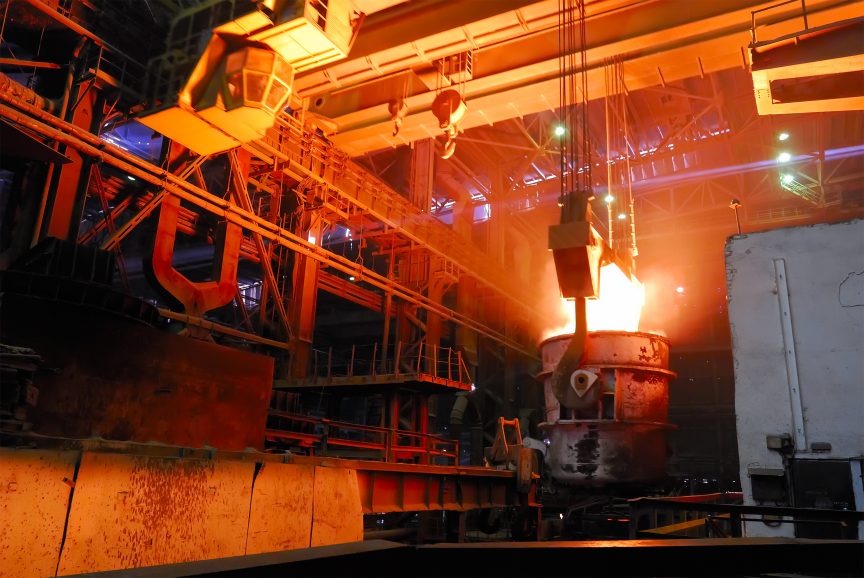Driven to develop a higher quality product, steel manufacturers have transformed a smaller Canadian city into a center for innovation in the steel industry.
While steel manufacturers have long championed a “new steel,” they’ve worked even more tirelessly in recent years to transform the industry. As competition from aluminum and plastics increases and demand for more fuel efficient cars grows, industry leaders are working to produce lighter high-strength steel that can meet the demands of modern consumers and businesses while remaining as durable as its heavier counterpart.
This quest for “new steel” has affected the entire industry, spurring rapid research into new production processes. While this pursuit has impacted many businesses and centers of commerce, it’s had a particularly significant (and unlikely) effect on a small city in the Canadian province of Ontario.
The Epitome of a Modern Steel Mill
Hamilton, Ontario is Canada’s tenth-largest city. Home to the renowned McMaster University, it’s been an important industrial center since the late 19th century, but it didn’t have much of a connection to the steel industry until recently. Since the turn of the millennium, however, a number of researchers have set up shop here, looking to transform the steel industry by developing new, innovative methods of production.
Thanks to the efforts of these professionals, Hamilton has reinvented itself as a center of innovation in the steel industry. Many of these engineers and scientists are associated with McMaster University’s Department of Engineering, Automotive Resource Centre, and University Steel Research Centre. These institutions are complemented by a research and development facility operated by ArcelorMittal Dofasco, which commissioned a $120 million zinc galvanizing line in Hamilton for the processing of new steel.
Carrying (and Shedding) That Weight
Sweeping changes across the automotive industry are largely responsible for this heightened demand for innovation in the steel industry. As fuel efficiency standards rise, auto manufacturers have worked to meet these expectations by producing lighter cars, since they use less fuel. Indeed, a ten percent decline in weight results in a six or seven percent decrease in fuel consumption on average.
Steel manufacturers have had to innovate quickly to accommodate these demands, especially as auto manufacturers turn to aluminum, plastic, and other lightweight building materials. The steel industry remains convinced, however, that it can rise to the challenge and reduce the weight of its products.
“How does steel fight back? It is through ultra-light, thinner reinforced steel,” said Martin Ryder, a local professor of business. “They have to work with car companies as they develop the next generation of vehicle.”
A Change Is Gonna Come
Steel manufacturers are already seeing some dramatic benefits from the innovations spearheaded in Hamilton, most of which have been funded by the steelmakers themselves.
Most significantly, researchers in Hamilton have further refined the practice of lightweighting, which “has become the overall technology driver” in the industry, according to the University of Toronto’s Peter Warrian. With this stronger yet lighter material, steel manufacturers can remain the primary supplier of building materials for auto manufacturers.
In part, the steel industry is also working to overcome its own reputation. “This is not your father’s steel company,” Ryder says. “It’s a much more high-tech game than the average person imagines.” Thanks to the Hamilton-based researchers, consumer perceptions are changing in step with the pace of innovation.
Keeping the Process Clean
While high-tech steel manufacturing may be more environmentally friendly than ever, it still faces some unavoidable, dust-related obstacles, especially on yards and roads.
With over four decades of experience in the dust control business, Midwest Industrial Supply, Inc. has helped steelmakers develop customized application programs backed by patented dust suppressants that can eliminate fugitive particles throughout a worksite. When used correctly, our synthetic organic products such as EnviroKleen® settle into any surface and seal the fines within it, preventing dust from escaping as soon it’s generated while reinforcing the roadbed.
Regardless of your company’s dust control needs, we can construct a custom managed service program for you that minimizes maintenance costs and ensures compliance with environmental regulations. We also offer assistance with customer-applied programs, as well as turn-key delivery and application. If you’re searching for a proven solution to your operational challenges, Midwest is ready to help.


